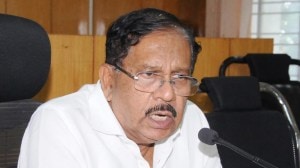Amid Justice Gangopadhyay row, recalling retd HC judge Karnan’s battle with SC
In May 2017, former Calcutta HC judge Justice CS Karnan was sentenced to six months in jail for contempt of court, making him the first sitting judge in the history of the Indian judiciary to go to jail.
 Justice Abhijit Gangopadhyay (left) and Justice (retd) CS Karnan (right). (File)
Justice Abhijit Gangopadhyay (left) and Justice (retd) CS Karnan (right). (File) The Supreme Court last week acted against Calcutta High Court judge Justice Abhijit Gangopadhyay, first reassigning the West Bengal teacher recruitment case pending before him, and then staying his order seeking a report from the top court’s Secretary General.
In response, Justice Gangopadhyay said Friday (April 28) he believes that “gradually all recruitment related cases will be taken away from me”, and added “Supreme Court jug jug jiyo (long live the Supreme Court).”
This is not the first time that a Calcutta High Court judge has locked horns with the top court.
In May 2017, former Calcutta HC judge Justice CS Karnan was sentenced to six months in jail for contempt of court by a seven-judge SC Bench led by the then CJI JS Kehar, making him the first sitting judge in the history of the Indian judiciary to go to jail.
Three days after the court’s order, Karnan sought to obtain a stay from the top court but failed. A month later, he retired from office and became a fugitive, evading arrest. However, within a few days, he was traced by the police to a resort in Coimbatore, and brought to Kolkata to serve his sentence in Presidency Jail.
Even before this, Karnan was no stranger to controversies.
In January 2014, he created history by becoming the first sitting judge in India to file a complaint of caste bias with the National Commission for SC/ST. “Some judges are very narrow-minded; they seek to dominate dalit judges,” Karnan had said in his complaint.
Thereafter, in March 2014, the Supreme Court came down heavily on him for storming into a Madras HC courtroom in January that year, alleging the selection of judges was being done in a manner that was “not fair” and “irregular”. Subsequently, the court termed his conduct as “indecorous” and “uncharitable”. A bench led by Justice BS Chauhan said Justice Karnan’s “raw unconventional protest” of walking into a courtroom and making statements when a division bench was hearing a writ petition against the appointments of judges to the High Court “raised a negative murmur about the maintenance of propriety in judicial proceedings.”
In February 2016, Justice Karnan “stayed” his own transfer order passed by the Chief Justice of India, transferring him from Madras to Calcutta High Court. By law, a lower court cannot sit over a judgment of the higher court, especially the Supreme Court. In the suo motu order, Justice Karnan said, “Your Lordship’s proposal for my transfer to the Calcutta High Court, citing better administration, has already been answered on an initial xerox copy of the present hard copy sent by Your Lordship.” Referring to the judgment by a nine-judge SC Bench headed by Justice S Ratnavel Pandian in 1993, he said the CJI’s proposal of transfer goes against this judgment. He also directed the CJI to file written submissions relating to his transfer and addressed a press conference from inside his high court chambers.
Shortly after, the top court directed the Madras HC Chief Justice to stop allotting judicial work to Justice Karnan. Following this, Justice Karnan met the then CJI TS Thakur and submitted a letter of apology for staying his own transfer, where he attributed the act to a “loss of mental balance due to mental frustrations,” on account of the alleged caste discrimination faced by him.
During his time at the Calcutta High Court, Justice Karnan in December 2016, wrote to the SC registry, seeking permission to argue a petition in person filed by the Registrar of the Madras High Court seeking to restrain him from doing any judicial work. Despite the top court having accepted his plea, in early 2017, Justice Karnan wrote an open letter to Prime Minister Narendra Modi and the CJI, making corruption allegations against 20 High Court and Supreme Court judges while suggesting that they be subjected to interrogation by investigative agencies. This action sparked a chain of events that subsequently led to the judge’s arrest.
Although the court had initially issued a non-bailable warrant to ensure his presence in court proceedings, back in March 2017, Justice Karnan had refused to show up, instead passing an order against the seven judges, including the CJI, to appear before him at his “residential court,” for insulting him in open court. Finding this order contemptuous, the top court ruled, “The tenor of his press briefings and purported judicial orders passed by Justice Karnan, prima facie suggest that he may not be in a fit medical condition to defend himself in the present proceedings” and directed that he undergo a medical test. The court also clarified then that no authority would be required to act on any order passed by him.
- 01
- 02
- 03
- 04
- 05






































